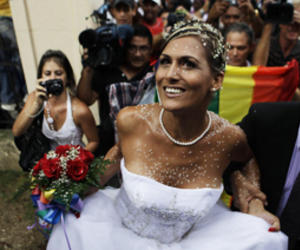Cuba transgender wedding shows shifting attitudes
- Submitted by: manso
- Society
- 08 / 15 / 2011

APBy PETER ORSI. HAVANA (AP) — A gay man and a woman whose sex-change operation was paid for by the state tied the knot Saturday in a first-of-its-kind wedding for Cuba, a sign of how much the country's attitude toward sexuality has changed since gays and transsexuals suffered persecution in the early years after the revolution.
Bride Wendy Iriepa, 37, arrived at a Havana wedding hall in the afternoon in a vintage Ford convertible and a full white wedding gown, flowers in her hair and holding a rainbow flag. Neighborhood residents came out of their homes to gawk at the wedding party and the journalists mobbing the car.
This is the first wedding between a transsexual woman and a gay man," said the 31-year-old groom, Ignacio Estrada. "We celebrate it at the top of our voices and affirm that this is a step forward for the gay community in Cuba."
Inside, a public notary joined them in a brief civil ceremony and the newlyweds kissed to cheers from friends and family.
Gay marriage is not legal in Cuba and Saturday's wedding does nothing to change that since Iriepa, born Alexis, is a woman in the eyes of the law.
Iriepa had sex-change surgery in 2007 as part of a pilot program that began in earnest the following year and made gender-reassignment procedures part of the island's universal health care system. One other transgender woman married many years ago, but Iriepa is the first to do so under the new policy.
In the early years after Fidel Castro's 1959 revolution, homosexuality was considered highly suspect along with other "alternative" forms of expression, such as U.S. fashion trends and rock and roll.
Many gays and transsexuals were fired from government jobs, jailed, sent to work camps or left for exile. That climate of persecution was famously chronicled by exiled writer Reinaldo Arenas' autobiographical "Before Night Falls," later a feature film starring Javier Bardem.
Today, even if deep-seated macho attitudes toward homosexuality have not entirely disappeared, the island and its government are much more tolerant.
The country's most prominent gay rights activist is Mariela Castro, Fidel Castro's niece and President Raul Castro's daughter. She heads the National Sex Education Center and is firmly established in Cuban officialdom.
At a transgender event Friday, she spoke of her institution's work, including anti-homophobia campaigns and pushing the state to cover the sex change operations. Castro is also lobbying for same-sex unions, though no law has yet been passed.
"One of our accomplishments has made it possible for Wendy to get married," she said. "It seems she found the love of her life and we wish her many congratulations, because all of our work has been for this, the well-being and happiness of our sisters."
Like so many things in Cuba, Saturday's nuptials have been politicized and Castro's congratulatory words belied divisions that have taken hold within the gay movement.
Some have accused her of monopolizing the cause and struck out on their own, organizing a separate, smaller pride march this year and coming to be labeled members of a "dissident" gay community.
Estrada was part of that march, and Iriepa has parted ways with her job at the Sex Education Center, reportedly after Mariela Castro questioned the relationship.
Soon after, Estrada and Iriepa announced their upcoming wedding and said political dissident blogger Yoani Sanchez, whose writings about daily life have earned her both international fame and harsh condemnation from the government, would be maid of honor.
"How positive! Cuba now shows itself to be a kaleidoscope of ideas. Leaders of the Ladies in White dissident group also attended.
Mariela Castro said she was not invited to the wedding and accused rivals in the gay community of taking democracy-building money from Washington.
"U.S. government funds exist here to create LGBT (lesbian, gay, transgender and bisexual) groups that oppose the position of the National Sex Education Center," she alleged.
U.S. officials have spoken of retargeting funds to Afro-Cuban and LGBT groups, though it is not clear whether any such financial support has begun.
"I think this has been politicized by the Cuban government. I have not wanted to make this into a circus or something really political," said Iriepa, who thanked Mariela Castro for wishing them well. "It is the happiest day of my life."
The couple celebrated after the wedding at a party space next door and planned to honeymoon in an undisclosed location for a bit of privacy.
Associated Press writer Andrea Rodriguez in Havana contributed to this report.
Source: http://news.yahoo.com/cuba-transgender-wedding-shows-shifting-attitudes-...
Comments